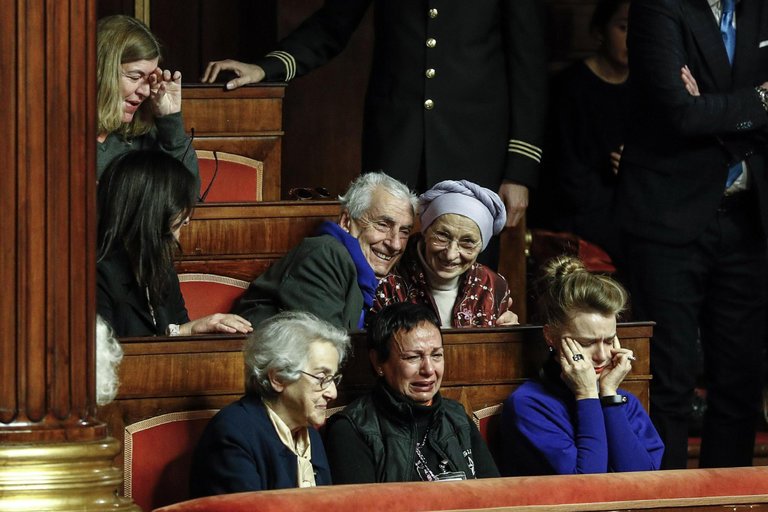Italian lawmakers passed a law on Thursday allowing adults to decide, in concordance with their doctors, their end-of-life medical care, including the terms under which they can refuse treatment. The law permits Italians to write living wills and refuse medical treatment, artificial nutrition and hydration.
The bill had languished in Parliament for 30 years, facing strong resistance from conservative Catholic lawmakers, who presented more than 3,000 amendments to stymie its passage.
The amendments were rejected on Wednesday, before the final vote of 180 to 71.
This law was the result of grass-roots lobbying, “otherwise we would have never made it to the end,” said Donata Lenzi, the lower house lawmaker who sponsored the bill through that chamber earlier this year, speaking to a small group of the law’s supporters who had gathered to celebrate in front of the Italian Parliament on Thursday morning.
“This law does not take anything away from any ill person, this law gives,” Ms. Lenzi said. “Because it recognizes that until the end you are not just a body to heal but a person with your own mind, your own ideas, your own convictions and you have the right to be heard.”
Some lawmakers who opposed the law said it effectively introduced state-sanctioned euthanasia.
“It’s a brutal chaos that doesn’t cancel suffering but instead aggravates it,” said Maurizio Gasparri, a member of the center-right Forza Italia party, during the debate in the Senate on Thursday. The law, he said, is confused from a legislative and constitutional point of view, and “profoundly wrong from an ethical and moral point of view,” regardless of one’s religious beliefs.
Pope Francis unexpectedly bolstered the prospects of the bill last month when he told participants at a medical conference in the Vatican that while euthanasia or assisted suicide was not permitted, stopping treatment for terminally ill people could in some cases be “morally licit” and “acknowledges the limitations of our mortality, once it becomes clear that opposition to it is futile.”
“It is clear that not adopting, or else suspending, disproportionate measures means avoiding overzealous treatment,” the pope said.
Determining the best course of action for a dying person requires interacting with the patient, the patient’s family and doctors, because “the mechanical application of a general rule is not sufficient,” he said.
Supporters of the bill used the pope’s words to dismiss Catholic critics, noting that Francis had merely reiterated the longstanding teachings of the Roman Catholic Church when he said that its doctrine on the sanctity of life did not justify overzealous medical treatments to artificially prolong life.
Parliamentary debate also surged on momentum created by a headline-grabbing trial currently underway in a Milan courtroom. Marco Cappato, an activist, has been charged with “reinforcing the suicidal will” and assisting with arrangements for the suicide of Fabiano Antoniani, who died in a Swiss clinic on Feb. 28. He faces up to 12 years in prison.
Mr. Antoniani, a disc jockey known as D.J. Fabo, was left blind and paralyzed after a 2014 car accident. He breathed through a respirator, ate through a feeding tube and spoke with difficulty, though he remained lucid to the end.
In January, Mr. Antoniani posted a video appealing to President Sergio Mattarella to urge the government to pass a law allowing euthanasia. A popular television program, “Le Iene,” championed his cause, producing several segments about Mr. Antoniani before and after his death in February.
A sentence is expected in mid-February.
For many right-to-die advocates, the law on living wills is a starting point for the infinitely tougher battle to allow terminally ill Italians to end their lives at home with medical support, rather than having to travel to countries where it is allowed.
Mr. Cappato has founded an association, Soccorso Civile, that provides information for terminally ill Italians. It has already helped three people go to Switzerland to end their lives and has received hundreds of requests for information, he said.
He and Mina Welby, the widow of Piergiorgio Welby, whose battle to end his life made headlines in 2006, are being investigated in the city of Massa Carrara in connection with the assisted suicide of Davide Trentini, who died in April.
“Every year the Italian state receives death certificates for 50 Italians” from towns in Switzerland that have clinics where assisted suicide is practiced, Mr. Cappato said in an interview this month.
“The Italian state knows what is going on but allows this to happen clandestinely,” he said. “If I am acquitted, at least these trips could happen openly. But my objective is that medically assisted suicide and euthanasia become legal in Italy.”
Also applauding the law’s passage was Filomena Gallo, the national secretary of the Luca Coscioni right-to-die association. It has been a long series of “legal battles and suffering and then decisions that gave back the power to decide over one’s own life,” Ms. Gallo told supporters on Thursday.
She noted that a bill allowing euthanasia had gathered 67,000 signatures on a petition and had been submitted for discussion in the legislature but had not been addressed.
“We will propose it again in the next legislature,” which will begin sessions after elections next year, she said.
“Now we know that battles for the freedom of persons can arrive at their objective.”

L’Associazione Luca Coscioni è una associazione no profit di promozione sociale. Tra le sue priorità vi sono l’affermazione delle libertà civili e i diritti umani, in particolare quello alla scienza, l’assistenza personale autogestita, l’abbattimento della barriere architettoniche, le scelte di fine vita, la legalizzazione dell’eutanasia, l’accesso ai cannabinoidi medici e il monitoraggio mondiale di leggi e politiche in materia di scienza e auto-determinazione.

